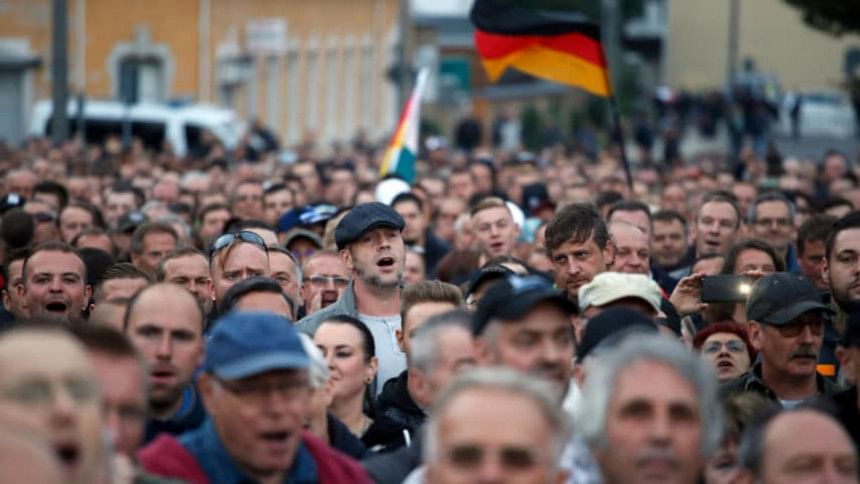White supremacists, western civilisations and eastern migrations

In 1889, Rudyard Kipling crowed: "Oh, East is East, and West is West, and never the twain shall meet." But the East and the West have been mingling even before his time and forever afterwards.
However, human perceptions on civilisational attachments are swayed more by violence inflicted on our abstract identities than by anecdotal evidence across all shades of grey. Since the Gulf Wars began nearly three decades ago and in the aftermath of the twin-tower terror attack in the US by Arab-origin terrorists, when the US and its NATO defence allies concocted military intelligence to justify pre-emptive invasion of a sovereign Iraq leading to millions of innocent people killed, injured and displaced, the world has never been the same again.
Adding to the burning embers in Palestine and later Afghanistan, wars and civil strife have engulfed Iraq, Libya and Syria where overwrought emotions pose a threat to escalating tensions that may spark much wider multi-country warfare with the real danger of pulling in the biggest military powers of the world.
In these increasingly turbulent times, peoples of war-torn countries are fleeing their homesteads in droves in search of peace and security seeking shelter in countries that are well-endowed economically and politically. For the last 50 years, that mantle has been in the hands of North American and Western European nations. It's no wonder that displaced people from many of the strife-torn Muslim countries have been emigrating to North America and Western Europe.
Large-scale migrations have taken place throughout history and countries in the Middle East and South Asia have hosted such migrant communities for millennia. However, ethnic Latin-American, African and Middle Eastern migrations in recent years have given rise to concomitant ethnic tensions and frictions in the host nations. In this backdrop, terror attacks on civilians by religious and political ideologues, ranging from sympathisers of white supremacists to "Muslim jihadis", are taking place at regular intervals in many countries of the world. By this measure, the apparent conflicts between Eastern and Western civilisations seem to bear out the "intractable" cultural differences hysterically preyed upon by Samuel Huntington in his famous 1996 book Clash of Civilizations where his own insecurities led him to advocate white supremacist fears in the garb of an academic analysis.
Even though the airwaves are dominated by the perceived fears and insecurities of peoples around the world, regurgitated by populist and parochial potentates adding fuel to fire in most situations, it is no wonder that we have frequent outbursts of terrorism and hate-mongering from one end of the earth to the other.
Anti-immigration sentiments are surging in the US, UK, France, Germany, and other countries of the NATO defence compact. This belies the fact that the US population is almost fully comprised of migrants while most European ethnicities are infused with the DNAs of many other ethnicities—some intra-regional while some are external. What this means is that such ethnic bias of the ethnic majority in any given country is prejudicial and often politically motivated.
In this roiling sea of hatred, a white supremacist terrorist from Australia chose to mow down 50 defenceless Muslim civilians as they gathered for their weekly prayer congregation in mosques in Christchurch city in New Zealand—the eastern-most and southern-most country on the planet. That such a heinous atrocity could take place in such a remote and peace-loving country was a real shocker to everyone. What, however, has given hope to people across the world was the way people of all ethnicities in New Zealand came forward unitedly to show solidarity with the aggrieved Muslim community. The way that tiny minority of immigrants and refugees were embraced by their neighbours' whole-hearted outpouring of empathy, collegiality and brotherhood—from haka dances of the indigenous people of New Zealand to non-Muslims joining the Friday Muslim prayer congregation for two minutes of silence—is an epic on how to turn a tragedy into an opportunity for upholding human dignity, how to turn a seething sea of abhorrence and ignorance into a calm sea of love and tranquillity.
The kind and emphatic leadership of Ms Jacinda Ardern, the New Zealand prime minister, has been truly exemplary and will remain an inspiration for other leaders around the world on how to mitigate the sufferings of affected people after a tragedy and how to rally the whole country and communities together in the face of barbaric treacheries inflicted on any community. On behalf of the migrant Bangladeshis who lost their lives in the Christchurch massacre, we can only hope that our government will invite the New Zealand prime minister to visit our country so that we can show our respect to this great leader and commiserate with their heart-rending grief. New Zealand, a remote bastion of western civilisation, has finally shown the world that East, West, North and South, all can cohabit this planet together and in peace.
Habibullah N Karim is an author, policy activist, investor and serial entrepreneur. He is a founder and former president of BASIS and founder/CEO of Technohaven Company Ltd.
Email: [email protected]







Comments